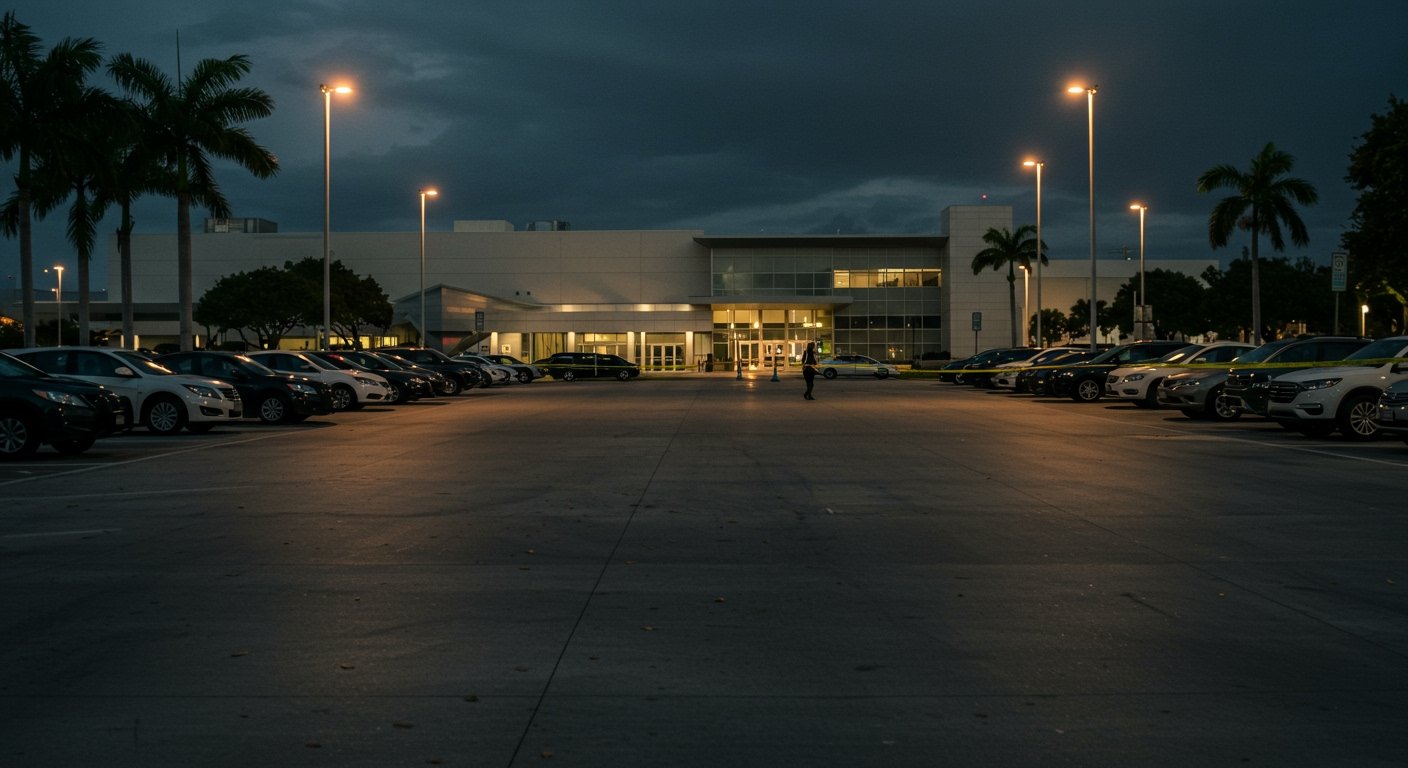Daysnel Hernandez, identified by authorities as a 41-year-old Cuban national residing in Doral, has been taken into custody and now faces a series of severe felony charges in connection with a brutal sexual assault that occurred in a parking lot near the Miami Airport Convention Center in Northwest Miami-Dade County. The incident, which transpired on Thursday, July 3, involved extreme violence directed at a young woman. Law enforcement officials confirmed Hernandez’s arrest over the recent weekend, stating his apprehension initially stemmed from an unrelated incident in Doral, occurring the following day. It was during his subsequent detention that, according to police reports, he reportedly confessed to his involvement in the earlier sexual assault.
The gravity of the allegations is reflected in the charges filed against him, which include kidnapping and sexual assault with a deadly weapon causing injury, among others, underscoring the profound threat posed by such violent acts to public safety.
A Brutal Assault Unfolds
The events of Thursday, July 3, paint a disturbing picture of an opportunistic and savage act of violence. According to detailed accounts provided by investigators from the Miami-Dade Police Department, the 28-year-old female victim was engaged in the routine act of parking her vehicle in a lot located in close proximity to the sprawling complex of the Miami Airport Convention Center, situated off Northwest 72nd Avenue. As she was completing this mundane task, she was reportedly set upon by her assailant.
Police allege that the attack commenced with shocking suddenness and brutality: the suspect, identified as Daysnel Hernandez, allegedly struck the victim forcefully in the head with a rock. This initial violent blow is believed to have disoriented or incapacitated her, allowing the attacker to escalate his actions. The report further details that Hernandez then allegedly used a screwdriver, placing the sharp point against the victim’s neck, to coerce her and forcibly drag her away from her vehicle and into a more secluded section of the vast parking facility.
Once isolated, the violence reportedly continued. Investigators state that the suspect then struck the victim multiple times with his fists before proceeding with the sexual assault. The victim’s ordeal resulted in significant physical injuries; police reports note she suffered multiple cuts and bruises as a direct result of the brutal attack. The deliberate use of common objects found in the environment – a rock and a screwdriver – as instruments of violence underscores the predatory nature of the alleged crime and the severe level of harm inflicted upon the victim.
Setting the Scene: A Hub of Activity
The location of the attack – a parking lot near the Miami Airport Convention Center off Northwest 72nd Avenue in Northwest Miami-Dade County – places the incident in a dynamic, high-traffic area. Northwest 72nd Avenue is a major north-south artery in this part of the county, intersecting with key east-west roads and situated within a stone’s throw of Miami International Airport. The surrounding area is a commercially dense district, featuring numerous hotels, rental car facilities, office parks, retail establishments, and, centrally, the convention center itself, which hosts a variety of events throughout the year, attracting both local residents and out-of-town visitors.
While the presence of constant activity might suggest a high level of public safety, large parking lots, especially those associated with major venues, can present paradoxical security challenges. Even amidst a bustling environment, sprawling lots can have dimly lit sections, areas obscured from main roadways, or become relatively empty during off-peak hours or late at night. The choice of such a location suggests an opportunity targeted during a moment of vulnerability for the victim, highlighting that potential threats can exist even in environments perceived as public or semi-public spaces. Law enforcement patrols in such extensive areas require significant resources to ensure comprehensive coverage and deter potential criminal acts.
The Immediate Aftermath and Initial Probe
Immediately following the report of the sexual assault on Thursday, July 3, near the Miami Airport Convention Center, detectives from the Miami-Dade Police Department’s Special Victims Bureau and Criminal Investigations Division launched a comprehensive investigation. The initial phase of the probe involved processing the crime scene to collect forensic evidence, such as DNA, fingerprints, and any potential physical objects left behind, like the rock or screwdriver reportedly used. Investigators also canvassed the area for potential witnesses who might have seen anything unusual around the time of the attack and sought surveillance footage from nearby businesses or the convention center itself that could help identify the assailant or his vehicle.
Simultaneously, detectives worked closely with the victim, providing support and gathering her detailed account of the terrifying experience, a crucial step in building a suspect profile and understanding the dynamics of the assault. Despite these immediate and diligent efforts, an arrest directly linked to the July 3rd incident based solely on evidence from that scene was not made in the immediate hours or days following the crime.
A Separate Incident Leads to Apprehension
The critical turning point in the investigation into the brutal July 3rd sexual assault came unexpectedly over the ensuing weekend. Authorities confirmed that Daysnel Hernandez was taken into custody in the city of Doral, a neighboring municipality. Crucially, this initial arrest was not directly related to the sexual assault case that had occurred days earlier. Police reports indicate that Hernandez was apprehended in Doral in connection with a separate incident, which, as later details emerged through the formal charges, involved a physical assault that occurred on Friday, July 4th – the day immediately following the sexual assault near the airport.
The circumstances of the Doral incident itself and the specifics that led to Hernandez’s arrest over the weekend remain somewhat shielded by the ongoing nature of investigations, but it is clear that this separate event was the catalyst for bringing him into police custody. Once in custody for the Doral matter, standard booking procedures would have taken place, potentially including fingerprinting and photographing, and his information would have entered law enforcement databases, linking him to ongoing investigations, including the July 3rd sexual assault.
Questioning and a Reported Confession
With Daysnel Hernandez in custody following the unrelated Doral incident, investigators working on the July 3rd sexual assault case were able to question him regarding the attack near the Miami Airport Convention Center. It was during this interrogation that a significant development reportedly occurred. According to information provided by law enforcement sources, Daysnel Hernandez reportedly confessed to his involvement in the violent sexual assault of the 28-year-old woman on Thursday, July 3.
A confession, if legally obtained and corroborated by other evidence, can be a powerful piece of evidence in a criminal prosecution, potentially solidifying the case against an accused individual. This reported admission directly linked Hernandez to the earlier, unsolved crime and provided investigators with potentially critical details regarding his actions and motivations. The confluence of the unrelated arrest for the July 4th incident in Doral and the subsequent questioning and reported confession regarding the July 3rd sexual assault in Northwest Miami-Dade forms the basis for the charges now being pursued against him for both events, highlighting how separate law enforcement actions can sometimes intersect to solve serious crimes.
Multiple Felony Charges Filed
The state has filed a comprehensive set of felony charges against Daysnel Hernandez, reflecting the alleged criminal conduct spanning two separate days and incidents. The charges specifically related to the violent sexual assault near the Miami Airport Convention Center on Thursday, July 3, include:
1. Kidnapping: Alleging that Hernandez unlawfully confined the victim against her will, likely referencing the act of forcibly dragging her from her vehicle to a secluded area within the parking lot.
2. Sexual Assault with a Deadly Weapon Causing Injury: This charge addresses the core crime of sexual assault and explicitly incorporates the alleged use of a rock and a screwdriver as weapons during the commission of the crime, resulting in physical harm to the victim (multiple cuts and bruises). The use of deadly weapons in a sexual assault significantly elevates the severity of the charge and potential penalties.
Additionally, Hernandez faces charges related to aggravated assault that appear to stem from both the July 3rd and July 4th incidents:
3. Aggravated Assault with a Deadly Weapon: While the summary lists this charge twice, suggesting it applies to distinct actions or incidents, one likely relates to the physical violence accompanying the sexual assault on July 3rd (striking with fists, potentially the initial rock blow), and the other connects directly to the separate physical assault that occurred in Doral on Friday, July 4th. The term “with a deadly weapon” suggests the use of an object capable of causing death or great bodily harm in both instances, although the specific weapon involved in the Doral incident has not been publicly detailed by police.
These charges, particularly those involving deadly weapons, kidnapping, and sexual assault, are among the most serious felonies under Florida law, carrying potential penalties ranging from decades in state prison to life imprisonment upon conviction, reflecting the profound harm caused to victims and the community.
Held at Turner Guilford Knight Correctional Center
Following his formal arrest and the filing of charges, Daysnel Hernandez was transported and booked into the Turner Guilford Knight Correctional Center (TGK). Located in Miami-Dade County, TGK serves as the primary intake and pre-trial detention facility for individuals arrested within the county’s jurisdiction. His presence at this maximum-security facility underscores the seriousness of the charges against him.
Individuals facing violent felony charges, especially those involving allegations of sexual assault and kidnapping with deadly weapons, are typically held without bond or with an extremely high bond amount, deemed a significant flight risk or danger to the community should they be released. Hernandez will remain in custody at TGK as his case proceeds through the initial stages of the judicial process, including arraignment, bond hearings, and preliminary hearings. His detention status will be periodically reviewed by the court as the case progresses.
Navigating the Court System
The arrest and charging of Daysnel Hernandez mark the beginning of a potentially lengthy and complex legal journey through the Miami-Dade court system. The State Attorney’s office will now rigorously review the evidence presented by law enforcement to formally prosecute the case, which may include testimony from the victim, forensic evidence collected from the scene near the convention center, documentation of the victim’s injuries, the reported confession, and evidence related to the separate Doral incident.
Hernandez will be appointed or will retain legal counsel to represent him throughout the proceedings. His case will move through standard court procedures, including initial appearances, a formal arraignment where he will likely enter a plea of not guilty, and extensive discovery phases where both the prosecution and the defense exchange evidence. Pre-trial motions will likely be filed by both sides, potentially challenging the admissibility of certain evidence, including the reported confession. A grand jury may also be convened to formally indict Hernandez on the felony charges, a routine step in serious felony cases. Should the case not be resolved through a plea agreement, it will proceed to trial, where a jury would hear the evidence and decide guilt or innocence based on the standard of proof beyond a reasonable doubt. Throughout this entire process, the principle of presumption of innocence remains a cornerstone of the U.S. legal system; Daysnel Hernandez is legally innocent until proven guilty in a court of law.
The Long Road to Healing
The 28-year-old victim of the sexual assault near the Miami Airport Convention Center on Thursday, July 3, has survived a traumatic and life-altering event. The physical injuries – multiple cuts and bruises – are a visible manifestation of the violence she endured. However, the emotional and psychological scars left by such an assault, particularly one involving kidnapping, physical beating, and the threat of deadly weapons, are often far deeper and require significant time, professional support, and resilience to address.
Survivors of sexual violence can experience a wide range of profound and lasting impacts, including anxiety, depression, post-traumatic stress disorder (PTSD), difficulty with personal relationships, and challenges in feeling safe in public or even private spaces. Resources are available within Miami-Dade County and through national organizations specifically dedicated to supporting sexual assault survivors. These resources offer confidential crisis intervention, counseling, medical care (including forensic exams), support groups, and legal advocacy to help victims navigate the complex aftermath of such crimes. Law enforcement agencies and the court system are mandated to uphold victims’ rights throughout the criminal justice process, including the right to be treated with dignity and respect, to be kept informed about the progress of the case, and to have measures taken to protect their privacy and safety.
Addressing Public Concerns
The alleged events occurring in a public-adjacent space like a parking lot near a major transit and convention hub in Northwest Miami-Dade raise pertinent questions and concerns within the community regarding safety in seemingly open areas. While such violent crimes are not commonplace, their occurrence underscores the need for continued vigilance and highlights potential vulnerabilities even in areas with significant pedestrian and vehicular traffic.
Local law enforcement agencies, including the Miami-Dade Police Department, work diligently to patrol commercial districts, transportation hubs, and surrounding areas, employing various strategies to deter crime and respond swiftly to incidents when they occur. The apprehension of a suspect in this case demonstrates the dedication of investigators to pursuing leads, utilizing forensic evidence, and leveraging information, even from separate incidents, to bring alleged offenders to justice and enhance community safety. Community members are often encouraged by authorities to remain aware of their surroundings, report suspicious activity promptly to the police, and take personal safety precautions, especially when traversing less populated areas of parking lots, walking alone late at night, or in unfamiliar locations.
Conclusion
The arrest and subsequent charging of Daysnel Hernandez in connection with the violent sexual assault near the Miami Airport Convention Center on Thursday, July 3, and a separate physical assault in Doral the following day, mark a critical step in the legal process seeking justice for the victims. Accused of kidnapping, sexual assault with a deadly weapon causing injury, and aggravated assault with a deadly weapon in connection with these incidents, Hernandez is currently being held at the Turner Guilford Knight Correctional Center as the serious felony charges are adjudicated. As the case proceeds through the Miami-Dade court system, the focus will shift to the rigorous presentation of evidence and adherence to legal procedures, ultimately determining culpability for the alleged brutal acts. The incident serves as a somber reminder of the reality of violent crime and the profound impact it has on victims and communities, while highlighting the complex and often challenging work of law enforcement and the judiciary in addressing such grave offenses and striving to enhance public safety.





